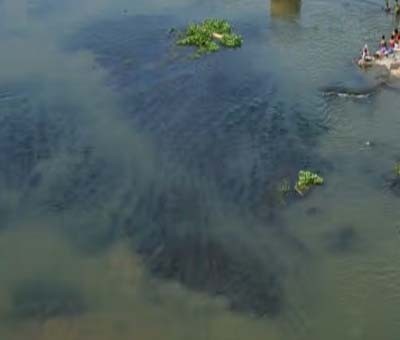
Chennai, The Thamirabarani river in Tamil Nadu continues to be polluted even after repeated reminders by the Central Pollution Control Board and the National Green Tribunal.
Untreated sewage and organic waste from the villages on its banks and industries is leading to massive pollution. The river, according to environmentalists, has been polluted beyond limits by the direct discharge of sewage, and domestic and solid waste by many local bodies on the banks of the river.
Studies conducted by the environmental organization, Society For Action against Environment (SAAE), have found that Marappanadu village on the banks of the river directly discharges around 54 kilolitres of untreated sewage into the river and near the drinking water pump house.
The study also found that 44.313 million litres per day of sewage water is being discharged into the river from the local bodies. Tests conducted on river water samples revealed that the mineral content of the water did not meet the required standards.
Sumesh Ranganathan of SEEA told IANS that "The water quality of an important river like Thamirabarani which provides water to Tuticorin has to be improved and the Water Quality Criteria (WQC) has to be maintained which is unfortunately not met even for bathing purposes."
He said that the water samples collected at Manimutharu, Punnakayal and Eral did not comply with the standards of dissolved oxygen. The study also found that at Punnakayal village, the pollution is 6 times that of the permissible level.
Faecal coliform is also high in the water of the Thamirabarani which is a major source of drinking water for many villages on its banks.
Sekhar Rajendran, an activist at Thoothukudi, told IANS that "Even as the pollution control board has directed the local bodies to install sewage treatment plants for recycling the waste water, it cannot be allowed and we strongly object to the discharge of sewage into the water even if it is treated."
The special bench of the National Green Tribunal had in May 2022 observed that despite spending Rs 52 crore under the National River Conservation Project, 80% of the sewage was still getting mixed with the Thamirabarani water.
Human rights activist S.P. Muthuraman had moved the State Human Rights Commission to seek directions to initiate legal action against the Tamil Nadu Pollution Control Board and the Public Works Department officials for human rights violation.
He has quoted the Supreme Court observation in the Subash Kumar vs State of Bihar case that the right to live includes the right to enjoy pollution-free water and air.
Many rivers in Tamil Nadu are being polluted with the officials divided over whether treated sewage could be discharged directly into the river or not. However, activists and environmentalists are of the opinion that direct discharge of sewage water even after treatment could increase the possibility of the river getting polluted with faecal coliform bacteria being detected in rivers where direct sewage discharge after treatment is done.
The Tamil Nadu Pollution Control Board and the PWD, the two bodies that are maintaining the rivers, must ensure that the river water meets the Water Quality Standards and that the people enjoy pollution-free water and air.


.jpeg)

